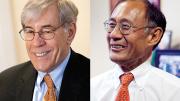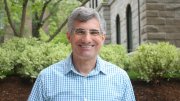As reported last October, Robert D. Reischauer ’63 will conclude his service as senior fellow of the Harvard Corporation, the University’s senior governing board, at the end of the academic year, and will be succeeded by William F. Lee ’72—thus effecting the first such regular transition envisioned as part of the governance reforms adopted in late 2010. Among the principles adopted then were term limits for Corporation members, and the practice of choosing a senior fellow, rather than conferring the role on the basis of length of service. Reischauer and Lee reviewed the status of the governance reforms and some of the Corporation’s operations during a joint conversation at Loeb House on the afternoon of May 1. Some highlights follow.
• The Corporation’s composition. “The Corporation has matured in its new form,” Reischauer said, “and we are about to go through the first round of regular reappointments of an expanded” board: long-serving members step off, pursuant to the term limits (six years, with the prospect of one six-year extension), and “new blood is infused.” Robert E. Rubin ’60, LL.D. ’01, is also stepping down at the end of June. (The two newly elected fellows are Kenneth I. Chenault, J.D. ’76, and Karen Gordon Mills ’75, M.B.A. ’77.) Reischauer pronounced himself “very optimistic about the strength and stability that this will give to the governance process at Harvard.”
Given the multiple appointments made to bring the Corporation to its expanded size of 13 members (including the president and treasurer), and the regular vetting and election of fellows to renew the board in keeping with the term limits, he said, “We've been through the process several times, and it’s not new anymore—[but] it’s still exciting.”
• A new operating environment. The standing committees established as part of the reform—on finance; facilities and capital planning; alumni affairs and development; and governance (chaired by the senior fellow)— “are functioning well in their role as advisers to the fiduciary responsibilities of the Corporation,” Reischauer said. “The processes of reviewing multiyear budgets, multiyear capital plans, risk assessment, are now well grounded, extremely well staffed, and I think all of us have a lot of confidence in the strength that this has given to Harvard’s leadership: the president, the various vice presidents, and the deans.”
• Enhanced expertise. Lee amplified, noting that the broader Corporation membership had, as envisioned, “allowed us to organizationally become more effective and efficient”—because of the committee structure and because of individual members’ experience and expertise. “So a Jim Breyer [venture capitalist James W. Breyer, M.B.A. ’87, elected a fellow in 2013] who is providing advice and enormously interested in the iLab and HarvardX and edX—we get the benefit of his expertise on a more focused level, on a project-by-project basis.”
Reischauer made the point more generally: diverse members’ perspectives on a broad array of issues “that before we weren’t able to cover probably in the depth that an institution of this size and complexity deserves.” He cited the international expertise of Jessica Tuchman Mathews ’67 (president of the Carnegie Endowment for International Peace, elected a fellow in 2012) on matters pertaining to Harvard’s global presence, and Breyer’s work in this realm, too.
Lee noted that there are now three fellows based on the West Coast: treasurer James F. Rothenberg ’68, M.B.A. ’70 (Los Angeles); Susan L. Graham ’64 (a professor of electrical engineering and computer science emerita at Berkeley); and Breyer (in Silicon Valley). They bring both geographic breadth and insight into the technology developments based there.
Beyond individual members’ contributions to the Corporation’s formal work (its committees, its annual financial reviews, and so on), Lee emphasized the role the board itself can play—with more members and expanded expertise—in becoming involved with specific issues as they arise. During the controversy over the privacy of electronic communications last year, for instance, the Corporation provided “input” to David Barron, Green professor of public law, as his task force examined University policy and procedures. The Corporation had its own task force on the issue, he said, that evolved into the faculty task force that addressed the issue longer term, and then was able to assure that the resulting recommendations were comprehensive and effective. “That’s something that we might not have been able to do” in the past, Lee said. Reischauer noted that having both legal expertise (Lee and Theodore V. Wells Jr., J.D.-M.B.A. ’76) and Graham’s computer-science expertise within the Corporation enabled it to review the policy in a nuanced way.
• Strategic planning. The expanded membership and committee structure were also intended to make it possible for the Corporation to step back from short-term concerns to address issues of longer-term strategic importance for the University’s future. “Now we are planning” multiyear “budgets, capital spending, and the campaign,” Reischauer said, “and that automatically makes you think more strategically than was maybe the case before.” He discerned a “fundamental change in the perspective of the Corporation away from the transactional and toward the longer-term. This has made the whole process of Harvard’s strategy in the twenty-first century much more valuable to the University.” Reischauer cited work on the evolution of teaching and learning during the next five to 10 years, Harvard’s global role, and a long-term response to the “highly probable” slowdown in federal funding for research. The discussions are “a major change over the 12 years I have been on the Corporation.”
“Figuring out how we get out of the anecdote of the day” to focus on broader issues is work, Lee said. The result is never perfect, he acknowledged, but the Corporation had made continuous headway, progressively assuming a truly fiduciary role, rather than a more managerial one.
Reischauer admitted, naturally, that in a large, complex institution with diffused power, “There are going to be crises that pop up from week to week.” The Corporation, unavoidably, is asked for advice on solving immediate problems and, more importantly, on how to avoid them in the future.
Lee observed, more generally, that the Corporation’s ultimate fiduciary responsibility must be guided by basic principles that provide guidance regardless of external circumstances or immediate issues. For Harvard as a whole, those are assuring that its “intellectual capital” (the faculty and students) is always sustained and enhanced as resources permit, and that the supporting physical and financial capital are in place to enable the intellectual mission to proceed. The Corporation, as the fiduciary body, must assure that the physical and financial resources are managed to support the intellectual capital at the highest possible level.
• The University’s leadership. With new processes in place to assure the Corporation’s self-renewal and succession, Reischauer and Lee were asked about the board’s oversight of University management and succession planning. Lee noted that “Since Bob became senior fellow, the question of evaluating both for succession planning and also for the positive feedback you can give folks to improve their feedback—the evaluation of the deans, the evaluation of the president and vice presidents—is something we do on a regular basis. It’s a big part of the retreat” the Corporation holds each summer. A subset of deans each year undergoes a five-year review with the president, who reports to the Corppration. The board conducts informal and formal reviews of the president and the president conducts a formal review of the executive vice president and other officers. He called this process “part of managing the capital of the institution.”
• Communications. Since the governance reform, the senior fellow has inaugurated occasional briefings on the Corporation’s work (like the May 1 conversation). Are further steps planned?
Reischauer termed the outreach to date “a work in progress,” with further measures meriting more attention. He noted that having a local senior fellow (Lee practices law in Boston) will encourage more informal connections—building on members’ meetings with “deans, students, faculty, and administrators” that no occur far more frequently than when he became a fellow in 2002. Come July, Reischauer observed, “two and a half” Corporation members will be embedded in Harvard:
- Lee, who teaches at the Law School (with sessions in the College and the business and medical schools);
- Lawrence S. Bacow, M.P.P.-J.D. ’76, Ph.D. ’78 (Tufts president emeritus), who is active at Harvard Kennedy School (HKS) and Harvard Graduate School of Education; and
- Mills, a fellow at HKS and the Business School.
Lee detailed some of the informal connections under way:
- a Corporation-faculty member dinner focused on online learning and issues associated with HarvardX;
- a Bacow-Lee meetings with all the schools’ financial deans—continuing Reichauer’s regular practice of doing so annually. (Reischauer said that represented “reaching several levels down below where the Corporation ever interacted before,” yielding useful exchanges.); and
- regular, informal meeting with students before Corporation meetings, and a couple of times yearly on specific subjects (such as undergraduates’ experiences in the January winter session; students’ use of the iLab; and the education school’s doctoral candidates in education leadership).
That tire-kicking is especially valuable for Corporation members, Reischauer said, who can thereby “understand some of the richness that is Harvard and spot problems that might be emerging.”
As Lee noted, “People want to be heard and respected,” and that sort of listening is “an important part of our job.
• In prospect. As he prepares to become senior fellow, Lee reflected that “one of the best things” about the governance reform as implemented is that “the openness and collegiality of the group is maintained even though it has doubled in size.” The expanded Corporation has retained its openness to discussion and readiness to raise difficult issues, he said. “It is still one of the most interesting, dynamic groups of people to be involved in discussion.”
Reischauer likened that spirit to a family talking over dinner: “Nobody feels restrained, people generally are on topic, there is nobody who abuses the privilege to speak, and it is just a very collegial experience. There are no subgroups who always agree with one set of positions.…I’d say for the next 300 years, we have the optimal size” for the University’s senior governing and fiduciary body.









